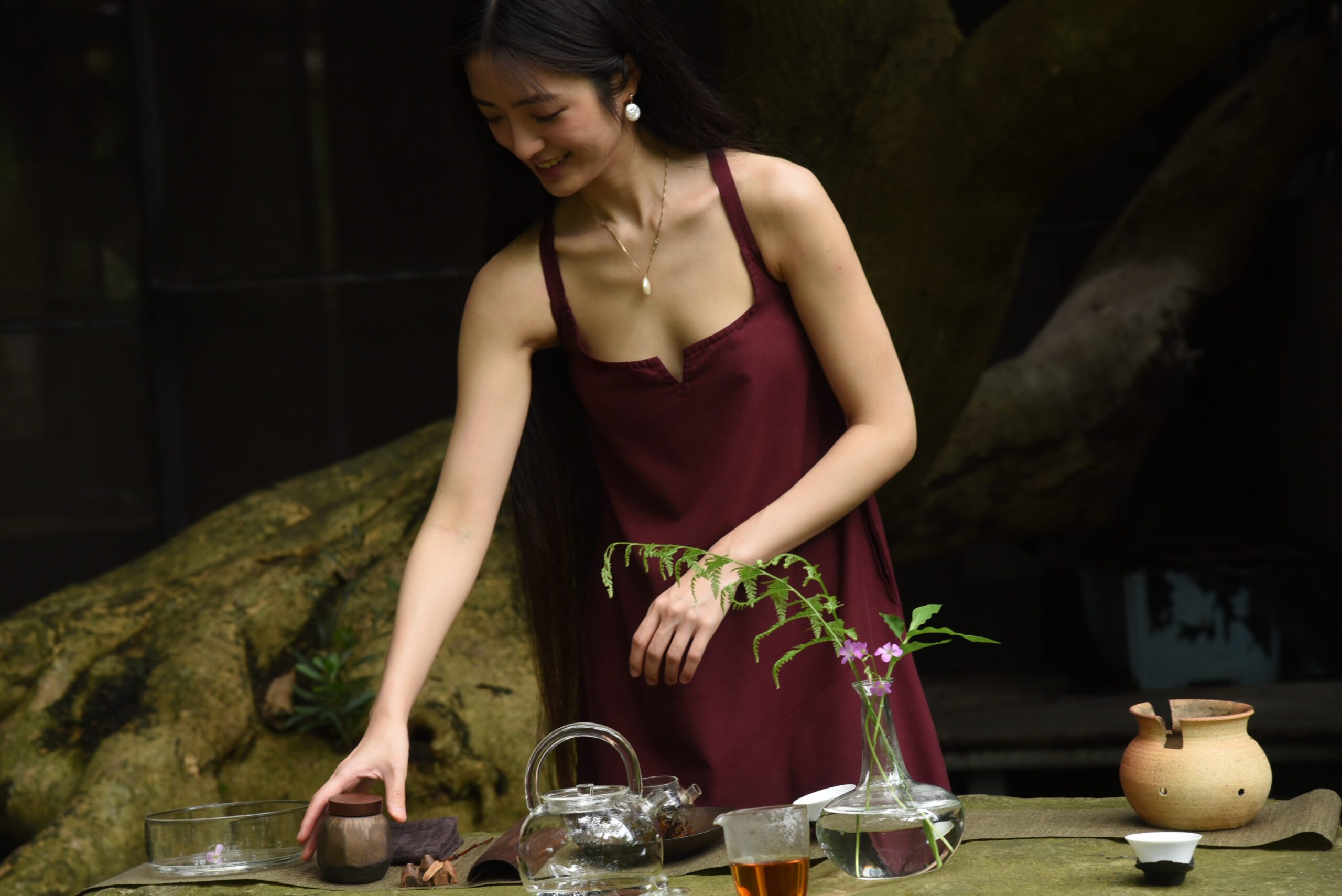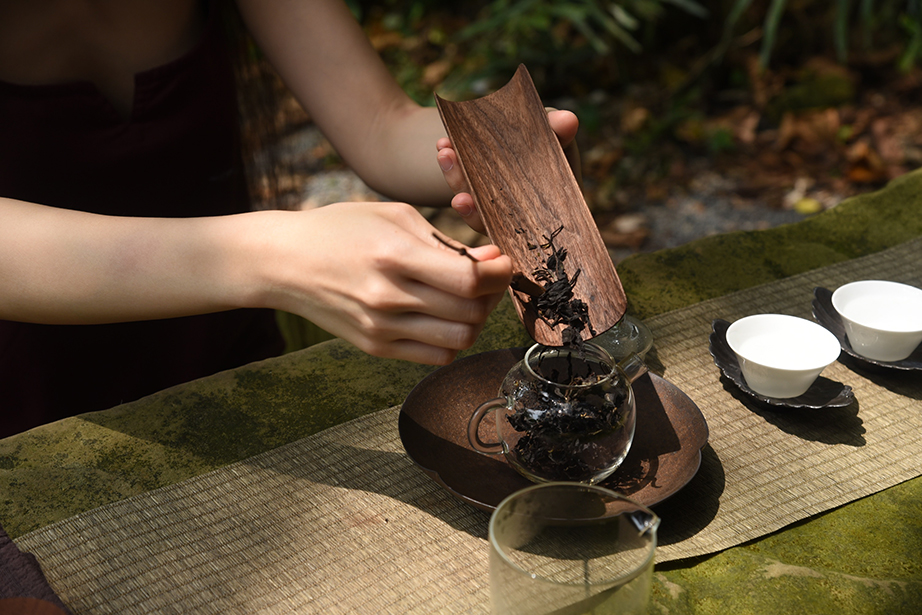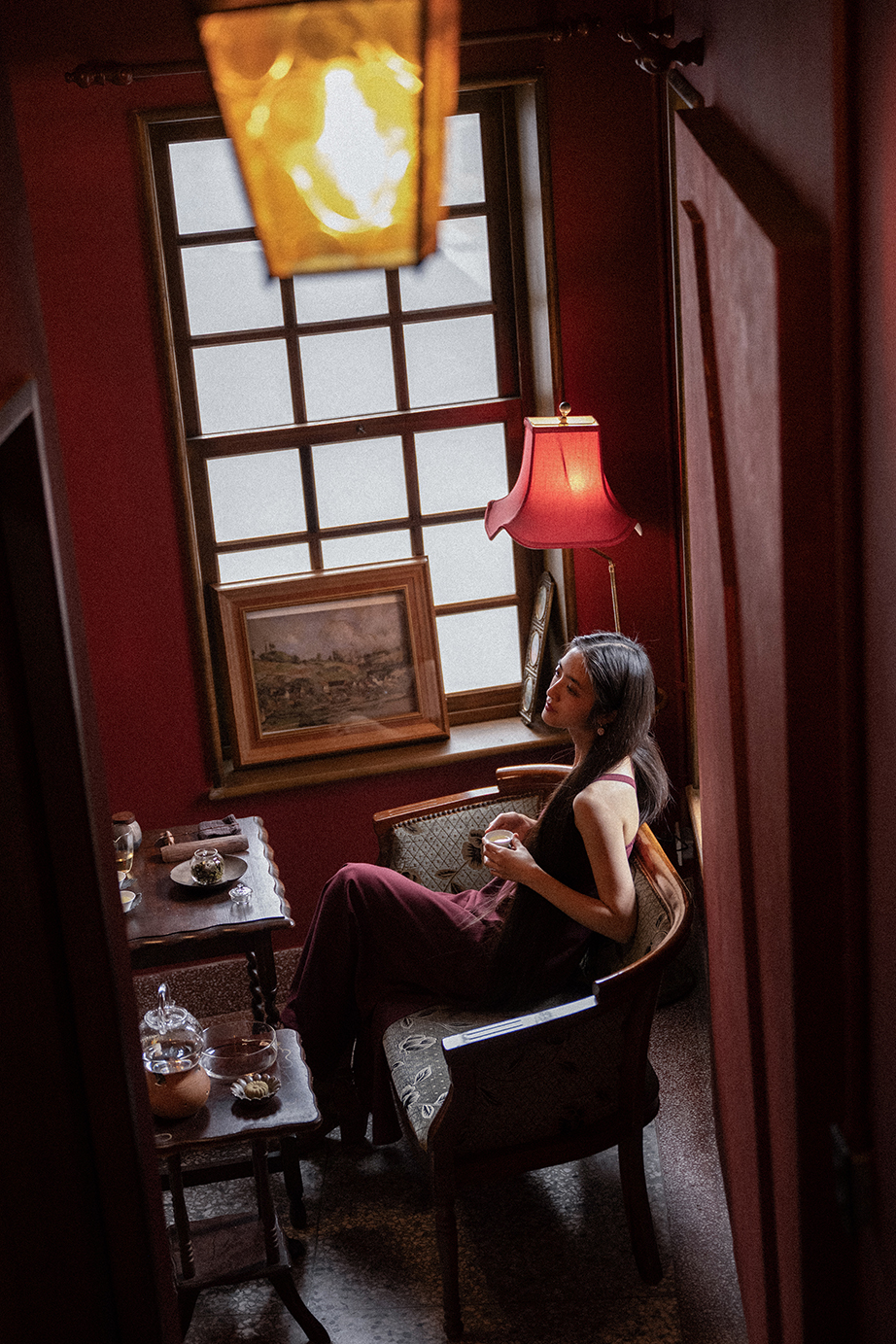Green teas are monks subscribed to a plain, austere life. Black teas are a brocade armchair by the fire, doubling as your therapist. But the Paochong is an oolong tea — a dancer, a show pony — the beauty pageant of teas.
On the morning of Friday, July 11, in between two live segments of business and politics news streams, I arrived on the rooftop of my New York apartment and laid out a standard six-cup Taiwanese heritage tea table. My neighbour Betül sat down. I rolled out a jar of Pinglin Paochong tea.
Green teas are monks subscribed to a plain, austere life. Black teas are a brocade armchair by the fire, doubling as your therapist. But the Paochong is an oolong tea — a dancer, a show pony — the beauty pageant of teas. Taiwanese Oolongs are all about conspicuous, aromatic show-off and steep competition amongst master tea artisans whose names continue to rise through the scent of collector-grade teas decades after they have passed. For just 600 grams, a high-caliber oolong could fetch upwards of US$30,000.
My Paochong, however, was no pageant material — just a sweet-tempered teen of humble dark jade hues, a wild-grown tea — my homegirl from Pinglin, the oldest tea district of Taiwan.
But I digress: Back to the news program.
The world is full of embittering stories — about wildfires breaking out across the Mediterranean, bombs dropping over the West Bank, the gunman in Midtown Manhattan who took four lives on 345 Park Avenue, and a fresh batch of Gen Z college graduates who struggle to find jobs that gen AI has automated.

Then, there’s my neighbour Betül, who stands immediately at the helm of news production. I first spotted her last summer, on the morning I bought a bagel on a whim, went to the rooftop, and chewed it up over a newspaper. The same morning, it dawned on me that two segments of a cable news program were being livestreamed, day after day, from this very New York rooftop by none other than journalist Betül Yürük, executive editor of Envoy Magazine.
At the time, I had just quit my U.S.-based AI startup job for a little more than half a year, which I spent mostly back home in Taipei, studying to become a tea practitioner. As a Gen Z young professional, I understood soon after graduation that my tech job may no longer exist by the height of my career, 20 years down the road. I sat down with a cup of tea to ponder this issue and sank slowly into tea addiction.
At some point, AI can run finance and market models faster and better than any human. But I’d like to think that half the point of sitting at a tea table with a tea practitioner is to sit at a table populated by humans.
A year later, this summer, I ran into Betül again, on the same rooftop. We sat down and brewed Paochong tea together.
The Paochong is almost always a spring tea. In 19th-century Taiwan, tea craftsmen in Pinglin used to wrap it in calligraphy paper and set it sailing down the Xindian Creek to Twatutia Harbour, then out through the Suez Canal to New York. I grew up right by Pinglin. I, too, found my way to New York.
The first brew tasted of sugarcane. The second wore a faint hint of jasmine.
Brewing tea with Betül was a marvelously odd experience, like incidentally trespassing upon an estranged past life. Growing up, I thought I’d become a journalist. My father was one. He covered business and politics — just like Betül.
In half my memories of him, he paced around the study with a cigarette and an article due tomorrow. In the other half, he sat by the side of a tea table in the piano room, surrounded by a motley crew of visitors. His regulars included some law people, government people, dancers, writers, a self-proclaimed inventor who said he talked to aliens, and a farmer who was the live-action version of Meursault from The Stranger.
As a 10-year-old, one of my favourite pastimes — aside from planting sunflowers and setting up fairy traps in the yard — was to sit by the tea table, where my dad livestreamed to this private assembly everything on his mind about the ongoing 2008 financial crisis, his admiration for the GNH Index, or the time 30 years ago when he got a death warrant in Indochina.
So it went: On a news assignment, he had stayed the night on the jungle premises of a remnant KMT guerrilla squad and awakened to the sound of bullets scattering across the floorboard. He witnessed an arms-trading deal, went home, and learned that a death warrant was upon him for being a “communist spy.”
So long as tea was pouring, stories were streaming. Nestled by the side of this table, 10-year-old me said I didn’t mind getting a Pulitzer Prize.
I never had the grit to become a journalist. But I went on to brew tea, here on a New York rooftop, opposite seasoned newswoman Betül. I lifted a ceramic kettle off a small candle-lit stove and tilted it, rinsing each teapot, pitcher, and cup in boiling hot water.
Betül spoke of home — of snowy Anatolian mountain peaks, which made for some of the world’s finest hidden gems for skiing — of Turkish black teas — five large glasses each morning for washing down an opulent breakfast of simit bread, cheeses, meats, fruit confits, and sauces of sorts. I once heard that the Turks love their tea so much — they leave nothing for export.
I spoke of home — of steep Pacific island slopes overlain with a blanket of mist, under which gardens of tea trees repose. In Taiwan, vast numbers of wizened tea addicts sip tea out of tiny ceramic cups — often some 40 milliliters each and six to a standard set. On the side of tea, they’d nibble on something small and sweet — dried guava, salted plum cakes, or mung bean fortune turtles.

Heritage Taiwanese tea has no sense of time management. Amid these clockless hours, the schedule can wait, no amount of bad news is bad enough, and one becomes convinced that there is a solution to every problem. Around the tea table, gangsters made vacation plans, and an investigator once showed me a photo of his calico cat, calmly licking its paw beside a Shiba Inu.
Around the tea table, news was made that became history. In the 1950s, from a small wooden home on Xinsheng South Road in Taipei, economist Chow Te-Wei (a student of Friedrich Hayek’s) met a regular assembly of scholars and laid the groundwork for a 50-year economic miracle that lifted Taiwan out of poverty. In the 1970s, his son Chow Yu kept the doors open to an ever more vibrant crowd of artists and thinkers. To his guests, he served up tea — paired with conversations about freedom and democracy.
In response to such gatherings, Taiwan’s then-authoritarian government installed intelligence operations opposite the house, under the guise of a candy shop.
But the tea boiled over. In the Formosa Incident of 1979, a good many guests of the Chow residence went to prison for instigating demonstrations that called for political reform. Their host, too, went into hiding.
Eventually, the incident subsided. Chow Yu returned home and beckoned the public to enter. His residence took on the name “Wistaria Tea House.” And democracy took root in Taiwan.
In Spring 2024, I moved into a Taipei apartment with a trunk of tea paraphernalia. The landlady was a hip young woman with close-shaved hair and a puppy on a leash. She wondered what brought me back from abroad. I told her I was here to formally study the tea arts.

“How old are you again?” she asked, looking me up and down — trying to make some numbers add up.
“26,” I said. In contemporary Taiwanese imagination, the tea artist is a silver-haired woman who was once 26 in the 1970s.
Taipei City is one vibrant town, crowned with skyscrapers, nightlife, and a surplus of charming cafés. From all over the island, bright young minds arrive in hopes of walking into the McKinsey office, wearing a black suit, or into the Google office, wearing a hoodie. Almost everyone has an English name here.
Meanwhile, the local dialects — predominantly Hokkien and Hakka — have faded. My go-to douli bamboo hat, which used to cost NT$50 at street-side plumbing shops, is no longer available in town at any price. Fifty percent of all tea gardens in Pinglin — just adjacent to Taipei — have been abandoned, alongside Hokkien-style courtyard homes weathering into exquisitely wistful, enigmatic ruins.
Tea houses fell out of vogue, making way for take-out iced tea shops. College students strut around campus sipping boba tea — a proud contemporary Taiwanese invention — through plastic straws.
Understandably, life has become very fast-paced. In the momentum of the same sentiments that fueled an economic miracle, many a Taiwanese dream of leading (or shall I say consuming) a life emulating that of a citizen in an “advanced” Western country, from top to toe and through the digestive tract.

But there is no time to digest. A post-90s generation reared on peacetime and boba tea begins to question if Taiwan could become ground zero for WWIII in a geopolitical showdown between the world’s two most powerful states. Twenty percent tariffs are settling in from the U.S., while mainland Chinese fighter jets have become avid visitors to the Taiwan Strait.
It seems almost condemnable that I find an air of peace on this New York rooftop, in the suspended time of a tea table. I passed to Betül a small cup of Pinglin Paochong. We observed the liquor’s light gold hues and took in a faint hint of jasmine. She asked if I’d write an article about tea, for readers who are tired of ingesting every day the same stories about war and politics.
Alas, war and politics — they too visit the tea table, and no one can stop them from sitting down. This table offers no refuge. But it is a place where all the world’s chaos can coexist in calm.
In this calm, a conversation is born on the frontiers of a dream — chemically straddled between the reason of caffeine and the reverie of L-theanine — with just enough space to meet all news with curiosity and to draft fresh stories on what is possible in this world.
Wisps of smoke rose from the teapot, and I watched. From the slowness of this practice, the mafia has gone on vacation, a democratic government was born, my dad cut through the weeds of a 2008 financial crisis, a Generation Z might finally escape the Matrix — and I’ve just accepted a writing assignment from a news editor, for a story that tastes a little bit bitter but a little bit sweet.





